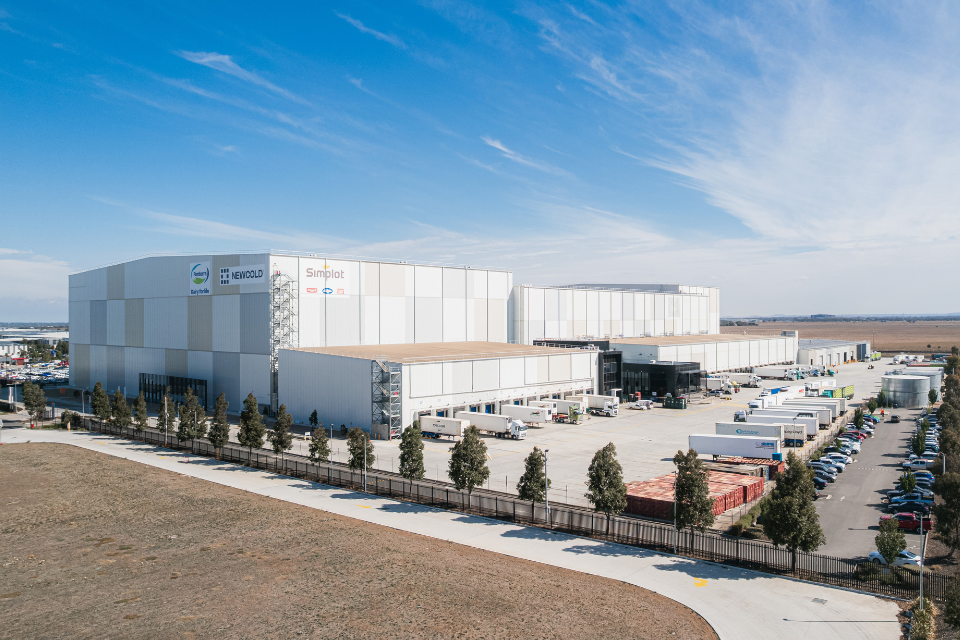This story was originally published on 16 June 2023 and updated on 21 January 2026.
Australian farmers currently produce enough food for 80 million people per year, or more than 3 times the needs of the local population. This means 70% of agriculture production is exported.
The Australian Government aims to boost this further under the Delivering Ag2030 plan to reach A$100 billion in food production by 2030.
The current shortage of cold storage capacity and efficiency is a significant barrier to growth. That’s where the innovative technology and expertise of NewCold comes in. Originating in the Netherlands, the temperature-controlled food logistics specialist is helping Australian food producers store produce safely, efficiently and sustainably.
NewCold opened its first frozen storage warehouse in Melbourne’s Truganina complex in 2017. The company now has 2 facilities in Melbourne with a combined capacity of over 327,800 pallets.
NewCold is growing its Australian presence, recently opening an office in Melbourne and announcing plans to build a third warehouse in western Sydney. However, the company’s ambition to address industry challenges goes much further. It wants to embed sustainability practices in Australia’s food supply chain.
Addressing cold storage resourcing challenges
Storing frozen food safely can be expensive – especially as land and energy costs increase.
Traditionally, cold storage warehouses need large amounts of both space and energy. Manual handling makes the process less efficient. Extra space is needed for vehicles and people to move around warehouses safely and temperatures cannot be as cold.
‘NewCold’s sites are generally at least 50% more energy efficient than traditional warehousing,’ explains Karthi Karthigeyan, NewCold’s Regional Managing Director ANZ. ‘They require fewer product movements and can use space more efficiently.’
High-bay storage, such as NewCold’s 43-metre-high Melbourne II facility, can store high concentrations of pallets in a relatively small physical footprint. Automation and robotics move pallets efficiently, while algorithms maximise storage efficiency.
NewCold’s sustainability goals do not stop there.
‘We’re doing some really interesting work on green energy,’ says Karthigeyan. ‘Over the next 5-plus years we would like to be self-sufficient with clean energy and even supply power to local councils and communities.’
Safer environments for people and products
Technology and automation bring other important advantages.
Handling goods at sub-zero temperatures can be physically demanding and dangerous. Automation and reduced manual handling make operating environments safer for employees.
Also, storage facilities can operate at lower temperatures and lower oxygen levels. This results in a lower fire risk and less likelihood of spoilage. Improved tracking can also reduce food wastage.
Customer partnerships drive expansion
Technology sets NewCold apart. However, Karthigeyan says the company’s real differentiator is its client relationships. NewCold is proud of its long-term relationships and some of those have taken it into new markets to support customers’ expansion.
Customer demand for increased storage capacity is what brought NewCold to Australia.
‘Australia is unique for us,’ says Karthigeyan. ‘We have large facilities in the UK, but nothing on the same scale as our Melbourne facility. There’s probably nowhere in the world where there's so much automated technology in one region.’

NewCold’s frozen storage warehouses are helping Australian food producers store produce safely, efficiently and sustainably.
Supporting domestic and export markets
The impetus to build at such scale in Victoria came from the high concentration of agriculture and food companies operating there.
While food from NewCold’s storage facilities feeds the domestic market, most of it is exported. This means safe storage and reliable tracking help preserve Australia’s reputation as a supplier of high-quality produce.
Partnering with Austrade
NewCold opened its first facility in Melbourne in 2017. Years later, plans to extend were challenged by COVID-19. The pandemic closed borders and disrupted supply chains. But it also underlined the need for more local cold storage capacity.
NewCold turned to Austrade for help with visa and logistical arrangements so key staff could set up systems and train local technicians.
‘Without Austrade’s support we would really have not been able to connect to the right people within the Australian federal and state governments,’ says Karthigeyan.
As the company has expanded in Australia, so has the relationship with Austrade.
‘It’s been a great partnership,’ Karthigeyan concludes. ‘Austrade appreciated that if automated solutions were not introduced, there could be a significant flow-on effect for the supply chain. They came and saw us in the Netherlands and did a great job of making sure that Australia was front and centre for us as a priority.’
The Netherlands is a global leader in agricultural production and logistics, says Austrade Investment Director Rolf Karst. ‘The Netherlands has a smaller land mass than Tasmania, but it is the second largest exporter of agricultural products globally. We’re excited to continue supporting companies like NewCold who can improve sustainability and efficiency throughout the supply chain.’
Developing skills to support the Asia-Pacific region
Karthigeyan explains that NewCold is looking to Australia to become a centre of excellence for a skilled workforce for the region. This will include developing automation and technical operating skills.
NewCold's bespoke technology platform also needs software-development skills. The project team in Melbourne is already designing local facilities, with support from Europe.
Plans for the future
NewCold started building its new facility in Western Sydney in 2024. This expansion is a sign of the growing demand from Australian customers for help in supplying quality produce to local and global markets.
‘There is always scope for increased scale and efficiency across the full logistics value chain,’ says Karthigeyan.
Go further, faster with Austrade
Subscribe to the Investment Update newsletter to find out about new investment opportunities, insights and investor success stories across Australia.